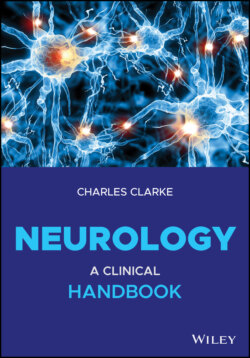Читать книгу Neurology - Charles H. Clarke - Страница 172
Dominant Parietal
ОглавлениеInability to execute a skilled movement despite no discernable weakness may be seen – apraxia. The patient may not respond to suggestions ‘imitate combing your hair’ or ‘pretend to turn a key’: a.k.a. ‘ideational’ apraxia. Alternatively, the patient may have difficulty imitating a meaningless gesture made by the examiner: ‘ideomotor’ apraxia. Typically, they are bewildered, moving the hand in a non‐purposive way or attempting to grasp the examiner’s hand.
Lesions may produce impairment of literacy skills: alexia, agraphia and acalculia. The rare constellation of these with finger agnosia (inability to name individual fingers and right–left disorientation) is known as Gerstmann’s syndrome. Auditory short‐term verbal memory can be impaired. Neglect of contralateral limbs is typically less prominent with a dominant than non‐dominant parietal lesion.
